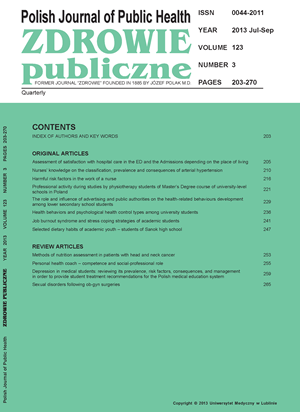Job burnout syndrome and stress coping strategies of academic students
DOI:
https://doi.org/10.12923/j.0044-2011/123-3/a.07Słowa kluczowe:
job burnout, stress, coping strategiesAbstrakt
Introduction. People focused on helping others in their daily professional career are especially exposed to stress. The inability to relieve stress is a common cause of the burnout syndrome. It turns out that also college students, who are prepared to work with people, are exposed to the job burnout syndrome, even during their education process. The possible cause might be unfamiliarity with effective stress coping methods or inability to use them properly.
Aim. The aim of this paper is to study job burnout syndrome and stress coping strategies among students of selected academic majors, and also to analyze relations and differences between these results.
Material and methods. The research has been conducted among 141 fifth or sixth-year students of nursing, medicine and pedagogy in Krakow. The study was based on surveys: a questionnaire made by the author, The Maslach Burnout Inventory (MBI) and The Coping Inventory for Stressful Situations (CISS).
Results. The analysis of obtained results has showed that there is a significant difference between stress coping strategies among examined students and that there is a relation between job burnout syndrome and students’ academic majors. There is also a relation between job burnout and stress coping strategies among students of selected academic majors. However, there is no relationship between job burnout and students’ selected academic majors.
Conclusions. There is also a relationship between students’ stress coping strategies and selected academic majors and burnout syndrome.
Bibliografia
1. Maslach C, Schaufeli WB, Leiter MP. Job burnout. Ann Rev Psychol. 2001;52:397-422. Review match
2. Tucholska S. Christiny Maslach koncepcja wypalenia zawodowego: etapy rozwoju. Przegl Psych. 2001;44(3):301-17.
3. Lazarus RS. Psychological stress and the coping process. New York: McGraw-Hill; 1966.
4. Bargiel-Matusiewicz K, Podbielski Z, Klasik A. Współczesne rozumienie stresu. Wiad Lek. 2004;LVII(3-4):188-92.
5. Endler WS, Parker DA. Multidimensional assessment of coping: a critical evaluation. J Personal Soc Psychol. 1990;58(5):844-54.
6. Jelonkiewicz I, Kosińska-Dec K. Poczucie koherencji a style radzenia sobie ze stresem: empiryczna analiza kierunku zależności. Przegl Psych. 2001;44(3):337-47.
7. Wilczek-Rużyczka E, Repka I. Professional burnout versus empathy in nursing and medical students. Zdr Publ. 2006;116(1):61-4.
8. Santen SA, Holt DB, Kemp JD, Hemphill RR. Burnout in Medical Students: Examining the Prevalence and Associated Factors. Southern Med Assoc. 2010;103(8):758-63. Review match
9. Watson R, Deary I, Thompson D, Li G. A study of stress and burnout in nursing students in Hong Kong: A questionnaire survey. Int J Nurs Stud. 2008;45:1534-42. Review match
10. Rosołowska J. Przyczyny stresu u studentów wydziału Nauk o Zdrowiu Akademii Medycznej w Poznaniu. Piel Poł. 2003;1(15):82-7.
11. Ordys D, Eszyk J. Próba oceny stylu życia młodzieży studenckiej śląskich uczelni. Annales UMCS Lublin, Polonia Sectio D. 2003;LVIII (Suppl. XIII)177:404-9.
12. Seyedfatemi N, Tafreshi M, Hagani H. Experienced stressors and coping strategies among Iranian nursing students. BMC Nursing. 2007;6:11. Review match
13. Galan F, Sanmartin A, Polo J, Giner L. Burnout risk in medical students in Spain using the Maslach Burnout Inventory-Student Survey. Int Arch Occup Environ Health. 2011;84:453-9. Review match
14. Dyrbye LN, Thomas MR, Huntington JL, et al. Personal Life Events and Medical Student Burnout: A Multicenter Study. Acad Med. 2006;81(4): 374-84. Review match
15. Deary IJ, Watson R, Hogston R. A longitudinal cohort study of burnout and attrition in nursing students. Blackwell Publishing Ltd. J Adv Nurs. 2003;43(1):71-81. Review match


